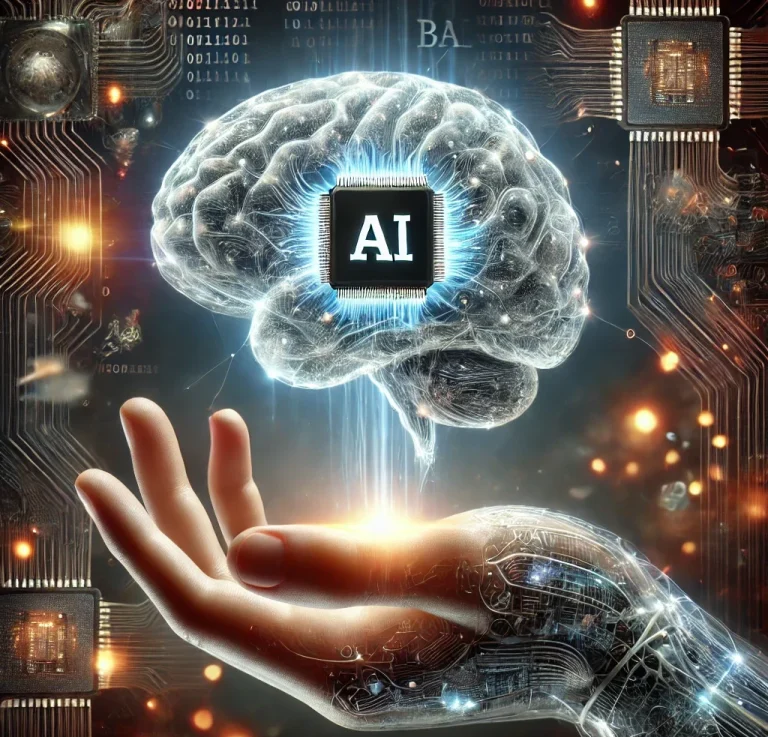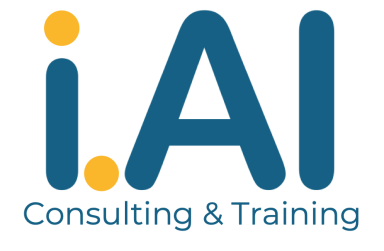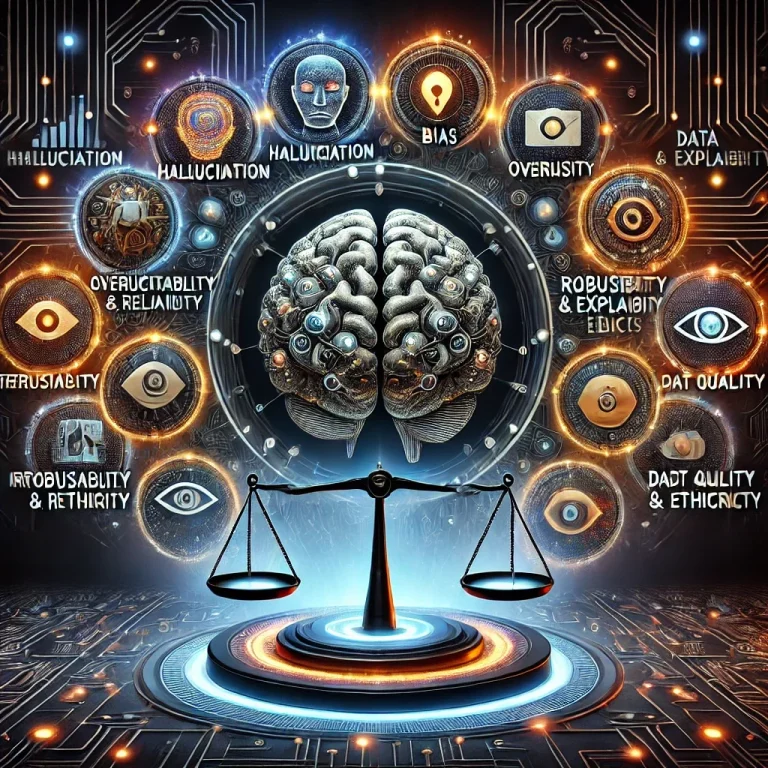RISKS, REGULATIONS &
FUTURE OUTLOOK
Artificial intelligence presents significant opportunities, but it also brings challenges.
This section highlights the ethical and safety risks associated with
bias, hallucinations, and the protection of data privacy.
Additionally, it covers legal frameworks such as the European AI Act,
which aim to ensure the safe use of AI, as well as future developments toward
Artificial General Intelligence (AGI) and beyond.

1. Risks & Limitations
Artificial intelligence (AI) simplifies and optimizes many professional tasks and processes, but it also carries significant risks.
Three of the most problematic potential issues with AI language models are hallucinations, overfitting, and bias.
- Hallucinations occur when AI models generate coherent-sounding but factually incorrect information. This can lead to significant errors with severe or even fatal consequences in fields like healthcare or financial advising. Measures such as ensuring high-quality training data, validating AI-generated results, and comprehensive user training can help minimize
this risk.
- Overfitting happens when a model is too closely trained on specific data, leading to errors in response to more general queries. To avoid overfitting, the training data provided to the AI model should be diverse and cover a wide range of topics and perspectives.
- Bias refers to prejudiced predictions from a model based on biased training data. This can result in discriminatory or one-sided statements, particularly concerning areas like human resources or justice. Using diverse, ethically sound training data is essential to avoid bias.
Other risks include the lack of transparency in many AI models’ decision-making processes, potential software errors with serious consequences in critical applications, and the danger of misinformation and manipulation through AI-generated disinformation and deepfakes.
Awareness of possible risks and knowledge of appropriate mitigation strategies are essential to ensure safe and ethical use of AI.
2. Legal Framework
The legal framework for large language models (LLMs) and artificial intelligence (AI) in Germany and Europe is complex and subject to ongoing adjustments to keep pace with rapid technological development.
The three main legal areas affected by AI development and content generation are copyright, personal rights protection, and data privacy.
- Copyright
Copyright in relation to artificial intelligence (AI) concerns the data used to train AI systems and the protection of AI-generated outputs.
For training data, the question is whether copyrighted material can be used without the consent of rights holders, especially concerning images, texts, or music that AI uses for optimization. Increasingly, regulations favor the rights holders.
For AI-generated outputs, the key issue is whether they can be copyrighted, as copyright traditionally requires human creativity. Since AI operates without "creative intent," protection is often only granted if a human significantly influences the creative process. In some countries, AI-generated works might be considered public domain due to the lack of a human author.
- Protection of Personal Rights
The protection of personal rights includes the right to privacy, the right to one's image, and informational self-determination, which can be threatened by AI applications.
A particularly critical issue is the data used to train AI systems, as they often rely on extensive datasets containing personal information without the consent of those affected. Without permission, this can not only violate personal rights but also undermine trust in AI.
Deepfakes and discriminatory decision-making processes also pose potential risks. The GDPR ensures the right to transparent, human-verified decisions.
- Data Privacy
The General Data Protection Regulation (GDPR) regulates the processing of personal data in AI systems related to AI development and usage.
AI systems must adhere to principles such as data minimization and purpose limitation, meaning only the data strictly necessary for training should be used and not for other purposes. Violations of the GDPR can result in substantial fines.
In conclusion, German law must and will continue to evolve alongside advancements in AI technology.
Additionally, regulations such as the EU AI Act outline essential guidelines for the ethical and legal development of AI.


3. A Look into the Future of AI
Current AI systems are limited to narrowly defined tasks and rely on established machine learning principles and algorithms. This type of artificial intelligence is known as Artificial Narrow Intelligence (ANI) and is widely used in specialized applications like speech and image recognition. Despite their often impressive capabilities, these systems lack human-like intelligence, as they cannot operate across contexts or learn independently.
The future of AI lies in the development of Artificial General Intelligence (AGI), which could understand, abstract, and apply human knowledge across diverse domains. AGI could expand its knowledge independently, solving problems in areas where it hasn’t been specifically trained. Currently, developing this advanced AI faces challenges in generalization and abstraction.
An even more distant but potentially revolutionary goal is Artificial Superintelligence (ASI), which would surpass human intelligence in all areas of knowledge and skill. While ASI remains a hypothetical target, its potential impact on society, the economy, and ethics raises profound questions today.
Many researchers, including prominent figures like Elon Musk and Nick Bostrom, warn of the risks posed by uncontrolled ASI.
In summary, AI has already profoundly impacted many fields, and its further development could shape society in lasting ways.
For more on what we understand by intelligence, the types of intelligence, and details about Artificial Narrow Intelligence (ANI), Artificial General Intelligence (AGI), and Artificial Superintelligence (ASI), see our deep dives on these topics.
©Urheberrecht. Alle Rechte vorbehalten. Datenschutz. Impressum.
Wir benötigen Ihre Zustimmung zum Laden der Übersetzungen
Wir nutzen einen Drittanbieter-Service, um den Inhalt der Website zu übersetzen, der möglicherweise Daten über Ihre Aktivitäten sammelt. Bitte überprüfen Sie die Details in der Datenschutzerklärung und akzeptieren Sie den Dienst, um die Übersetzungen zu sehen.





